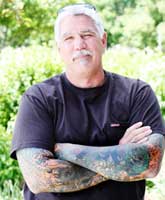Scholarship fund-raising program aims to help change the world
December 14, 2010 by Kyle Benning · Leave a Comment
Dr. Charles Quist-Adade is a lot more than an average sociology professor at Kwantlen Polytechnic University. He is also the founder of CANAFRE, the Canada-Africa Foundation for Rural Education and president of the Ghana Canada Association of British Columbia.
But it is how he is incorporating his students into his foundation which has taken drawn attention at Kwantlen.
Quist-Adade is a Ghanaian-Canadian who is heavily devoted to his community. In many of his courses, he provides students with an opportunity to make a change in society by raising funds for the Aklowa Scholarship Project. The goal of the project is to improve education in rural Ghana where more than 70 per cent of the youth live in village communities.
The scholarship provides primary school children who are in need with a backpack containing two sets of school uniforms, a pair of sandals, 24 exercise books, pens, pencils and a dictionary. The scholarships also pay for the child’s school fees and lunch for a year.
“It [the scholarship] is to help deprived students who cannot complete education because of lack of funds,” said Quist-Adade. “We give them kind of a lifeline to complete their education.”
Quist-Adade is from a rural community in Ghana and he knows how far each donation can go.
He received a diploma in journalism from the Ghana Institute of Journalism before being funded to study for his master’s degree and PhD in journalism and sociology in St. Petersburg, Russia.
“I thought that I should help realize the educational dreams of children in rural Ghana,” said Quist-Adade.
He allows his students to raise funds in any way they choose, with a target of $750 per group.
Jasman Virdi, a student in Quist-Adade’s social justice class, was part of a group that held a club night.
“In the end, we sold out. In total, we raised $1,080,” Virdi said.
Quist-Adade appreciates the effort put in by his students as he continues to improve education in his homeland.
“I want to thank my students for the enthusiasm, sacrifice and effort they put into fundraising,” said Quist-Adade. “By the time it is finished, I think we will have raised about $2,000.”
For more information on the foundation, or to donate, visit the project’s website.
Kwantlen event: Hello, Africa!
November 15, 2010 by Jeff Groat · Leave a Comment
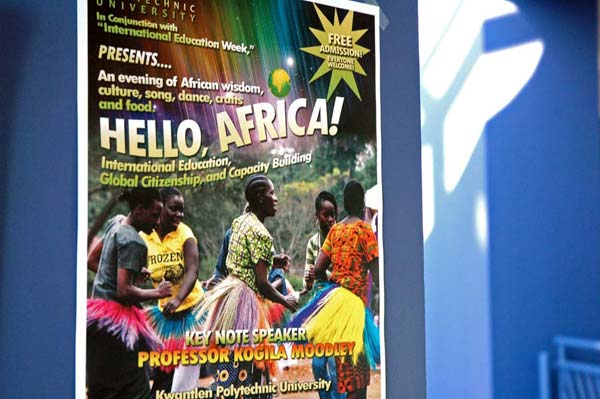
Hello, Africa! is being held at Kwantlen’s Surrey Campus on Monday, Nov. 15. The event will be “an evening of African words, wisdom, song, dance, drumming, crafts, food and drink.” Photo by Jeff Groat
Hello, Kwantlen, Africa’s calling.
Hello, Africa! kicks off International Education Week at Kwantlen on Monday and features a keynote address from UBC sociology Professor Kogila Moodley.
“This event came about as a result of myself and two colleagues going to Kenya this summer,” said Joan Nesbitt, who is part of Kwantlen’s criminology faculty and is an organizer of the gala.
“The three of us went to Kenya to look at the feasibility of setting up international field schools there,” she said. Part of the grant that paid for the trip to Kenya included a community dialogue session back at home, leading to Hello, Africa!
Moodley’s address is titled “Gandhi & Mandela: Reconciliation in Divided Societies” and is expected to touch on themes of building dialogue between local communities in the developed Western world and the continent of Africa, or the global south at large.
Nesbitt and her colleagues are in the very early stages of setting up international field schools in Kenya and Tanzania, where Kwantlen criminology or sociology students may be able to go on exchange.
Monday’s event is meant to highlight the importance of exchanges and of sharing educational resources between communities. It is sponsored by Kwantlen’s criminology department.
Moodley, according to the Hello, Africa! program, is professor of sociology at the University of British Columbia, where she was the first holder of the David Lam Chair in Multicultural Studies.
Speaking Session in Surrey: Don’t follow Rick Osborne’s path
October 4, 2010 by Paul Fleischanderl · Leave a Comment
Rick Osborne will be speaking about his about his real-life experiences with criminal activities, drug abuse and two decades in penitentiaries on Wednesday, Oct. 6 at the Surrey campus.
Who is Rick Osborne?
As a teenager in Ontario, Osborne fell in with the wrong crowd and drug addiction and street gang involvement ensued. At 21, he was a full-patch member of one of the world’s largest and powerful outlaw motorcycle clubs. Because of his criminal activity, he entered the federal penitentiary system and spend more than 24 years of his life — longer than most of Kwantlen’s students have been in this world — in penitentiaries all over Canada.
During his imprisonment he kick his drug addiction and parted with his gang life. While a federal inmate in maximum security, Osborne earned his bachelor degree in psychology from Queens University.
Since he left prison in 1993, he has travelled across Canada sharing his experiences about the dangers of gangs, drugs and criminal activity with kids and youth to prevent them following his path.
In 2008, he joined Astwood Strategy Corporation and the mentorship program Ozzy’s Garage was established. In this intervention program, at-risk kids build custom motorcycle choppers with Osborne and benefit from his experiences as a gang member.
His presentation, at 4 p.m., in room D128, is not just for Kwantlen students. “Any community member who is interested will be able to take away something from this session,” said Rob Rai, manager of Surrey Wrap Program and assistant manager of Safe Schools.
Osborne will tell how he got past his drug addiction and was able to break with his life in a gang. “It will be a combination of his journey and of his work with kids at Ozzy’s Garage”, said Rai. Osborne’s presentation is followed by questions and discussion. Admission is free.
The Speaking Session is hosted in collaboration with Safe Schools, Acting Together and the Centre for Interdisciplinary Research: Community Learning and Engagement.
Warrior Boyz comes home
November 6, 2009 by Justin Langille · Leave a Comment
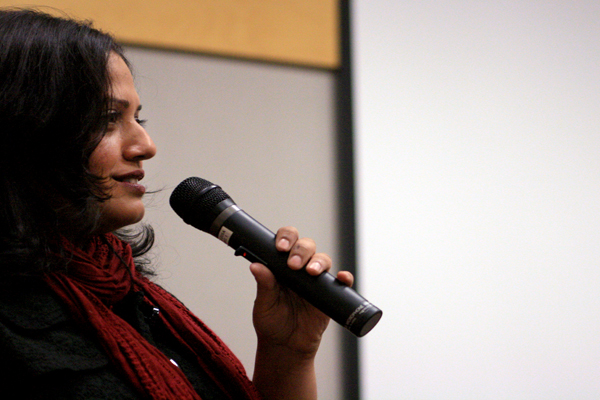
Filmmaker Baljit Sangra introduces her film Warrior Boyz to the crowd. “ We can’t deny it anymore,†Sangra said about the problem of youth gang involvement in the South Asian community. “The only way you’re going to make changes is by talking about it.†(Justin Langille photo)
It wasn’t a traditional homecoming, but the community of Surrey still welcomed it with open arms.
On Nov. 3, nearly 200 people gathered in the conference centre at Kwantlen Polytechnic University’s Surrey campus for an evening screening and panel discussion of Warrior Boyz, a documentary about the affect that gang culture has had on Metro Vancouver’s South-Asian-Canadian community.
“I’ve been wanting to do this for a long time, to show this film here in Surrey, at Kwantlen,†director Baljit Sangra proudly told the crowd. “Much of this was filmed right across the street from here at Princess Margaret [High School].â€
Moments later, the lights were dimmed and those in attendance were drawn into an intimate look at one of the Lower Mainland’s most notorious social epidemics, one that has claimed the lives of over 100 Indo-Canadian youth.
The forum, organized by faculty members of Kwantlen’s criminology department, offered students and residents of the community a chance to see Sangra’s take on the violence that has plagued the youth of Surrey.
Created in partnership with Canwest Global and the National Film Board of Canada, Sangra’s film follows the lives of Tanvir and Vicky, two young Punjabi teens who struggle to stay in school and on good terms with their family while spending their spare time embroiled in crime and gang fighting.
Through their stories, Sangra shows that alienation, unprecedented peer pressure and a desire for the status glamorized by depictions of gang life in pop culture have led many Indo-Canadian youth to chase empowerment through drug and violence-fuelled criminal lifestyles.
In an interview, Sangra said she decided to make the film when she realized that violence wasn’t letting up in Metro Vancouver’s large yet close-knit South-Asian community.
“It’s an issue that’s impacted me personally,†said Sangra. “I know people who have fallen into [gang culture] from the neighborhood; friends of friends, friends of cousins, that sort of thing. Even my parents are going to funerals of their friends who have lost a grandchild to gang violence.”
Sangra sought to understand what she saw as an overwhelming contradiction: youth from good families living in seeming suburban comfort who were becoming foot soldiers and chiefs for gangs involved in Metro Vancouver’s drug trade. With this in mind, she began talking to people in the community.
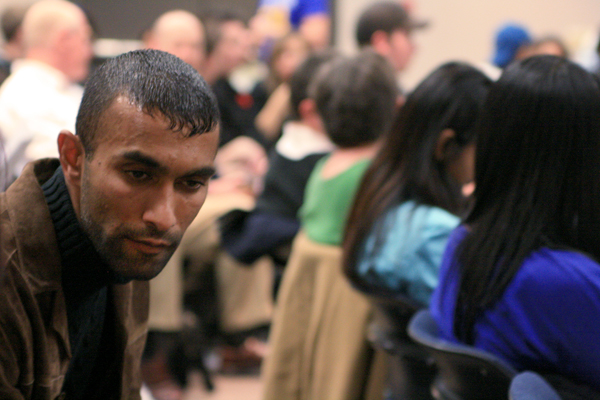
A central character in the film, Jagdeep Singh Mangat was also an important voice on the panel. Mangat challenged the audience to consider the influence that consumer culture and social alienation have on youth who enter into gang life. (Justin Langille photo)
Sangra said that building enough trust with her subjects to the point of being able to film them during vulnerable moments was the most difficult process of filming the documentary. The South-Asian community, she said, has a tendency to denial, and often prefers not to open up about sensitive social issues.
However, her persistence and dedication to the story paid off. Eventually, she gained an understanding of what was behind the headlines.
“For a lot of kids, it’s more about acceptance and belonging than money, “ said Sangra.
“I believe that all kids want to fit and also stand out in some way. And I think for some of the kids who are perhaps not the best student or athlete but come from a pretty solid family, that option of hanging out with the wrong crew or getting into trouble is pretty easy to fall into. Peer group pressure is huge.â€
Since debuting the film last spring and screening it at festivals across North America, Sangra has learned that teachers in schools and communities all across Canada have been showing it to students to show them the dangers involved in gangs as opposed to the glamour that they see on TV.
At the end of the screening, Sangra sat down with a panel of key players to discuss the factors that have led to the development of deadly gang culture in Metro Vancouver and the ways that communities can prevent youth from getting involved in the future.
The opinions of the panel members were diverse and informed by careers spent dealing with gangs from many perspectives. The panel, composed of law enforcement officials and educators, also included gang-member-turned-social-activist Jagdeep Singh Mangat, a former drug dealer and gang member who eventually left his life of crime to pursue education and community activism.
If there was one thing that the delegation agreed on, it was Mangat’s declaration that if people in Surrey and Metro Vancouver want to reduce youth gang involvement and the violence that results from it, they need to get involved in the problem.
“Don’t leave it to somebody else. You guys can seize initiative and do it yourself. Each and every single one of you can be an example to a lot of these young people. When we put our collective effort together, then it’s us that’s providing the support for people that might be falling through the cracks.â€

The panel, from Left to right: director Baljit Sangra, crown counsel Wendy Dawson, RCMP superintendent Dan Malo, Jagdeep Singh Mangat, Sociologist Indira Prahst and Sukh Rai vice principal of Frankhurt Secondary School. (Justin Langille photo)
Selections from the Panel
(Photos by Katie Lawrence, Audio by Justin Langille)
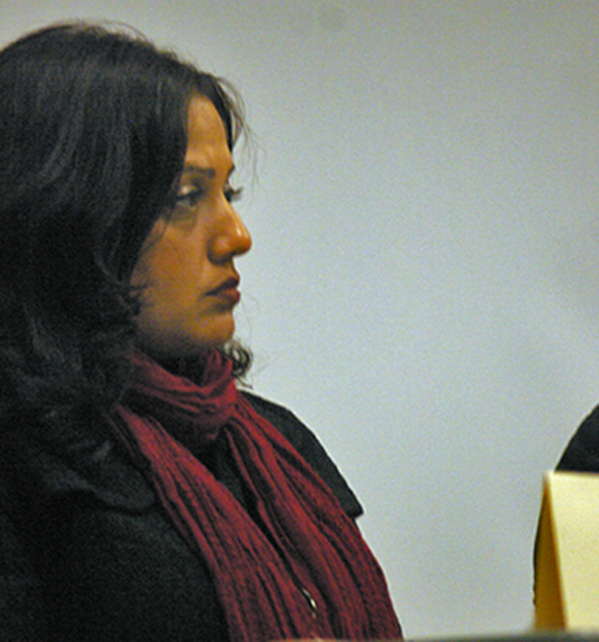
Baljit Sangra, director of Warrior BoyzÂ
[audio:http://www.kwantlenchronicle.ca/audio/sangra.mp3]
Sangra discusses her hopes for the film
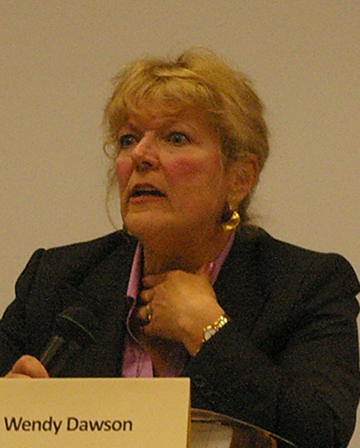
Wendy Dawson, crown counsel and leader of the Surrey Six prosecution team
[audio:http://www.kwantlenchronicle.ca/audio/dawson.mp3]
Dawson addresses the legal roadblocks that are preventing her prosecution team from moving forward in the Surrey Six trials
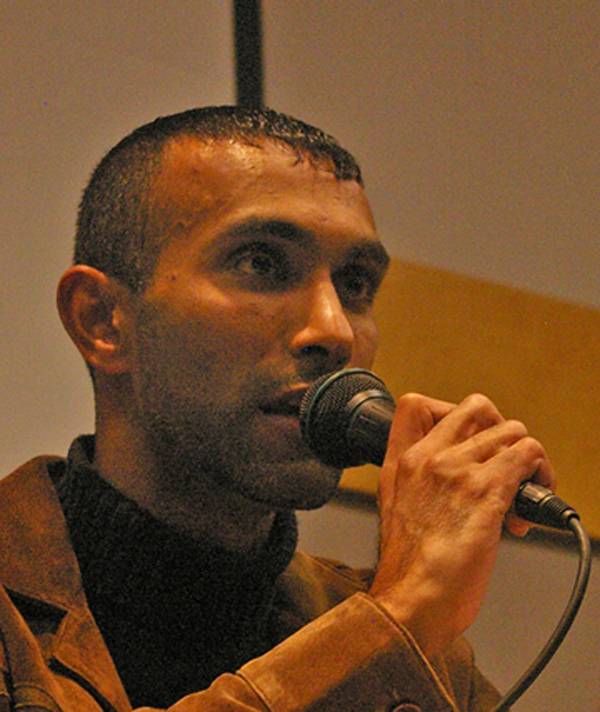
Jagdeep Singh Mangat, former gang member, UBC law student and social activist
[audio:http://www.kwantlenchronicle.ca/audio/mangat.mp3]
Mangat talks about the consumer culture roots of youth gang involvement
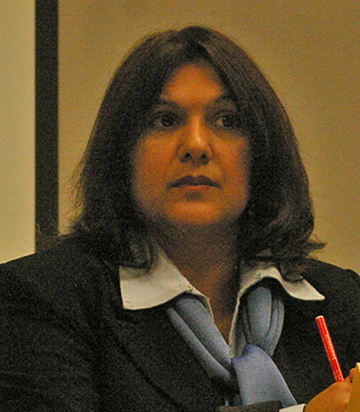
Indira Prahst, Department of Sociology, Langara College
[audio:http://www.kwantlenchronicle.ca/audio/prahst.mp3]
Prahst addresses the attractions and trapping of the gang ruled drug trade
‘Emily’ – a human face on post-secondary funding cuts
October 22, 2008 by Nick Major · Leave a Comment
“Emily” is a 24-year-old Kwantlen student and single mother of two small children, and at an Oct. 15 meeting her life story was used to give a human face to the issue of university funding cutbacks.
At the meeting of the Select Standing Committee on Finance and Government Services, two representatives from the Kwantlen Faculty Association used Emily’s story, as well as warnings about the current financial crisis, to appeal for restoration of post-secondary funding, which was cut 2.6 per cent in the March provincial budget.Vice-president Maureen Shaw, who is also an English instructor, appeared with secretary-treasurer and chemistry instructor Suzanne Pearce to share a Kwantlen counsellor’s story about Emily. She entered Kwantlen’s Special Education Teacher’s Assistant Program at the age of 19, already with a one-year-old child, and quickly became a star student, earning a GPA of 3.5 and serving as a student assistant.
Two years later, however, her marriage fell apart. Her husband and family abandoned her, and with all her family and financial supports gone, her student loans couldn’t cover rent, car expenses and daycare, driving her into debt.
Nt wanting to quit school altogether, Emily tried distance education but ran into more challenges, including a serious car accident and her son’s illness, before eventually recovering and rebuilding.
The biggest obstacle students face to completing their education, according to Shaw and Pearce, is financial. Restoration of the 2.6 per cent of funding that was cut was one of five recommendations they presented to the committee. The other four were restoring real per-student funding to 2001 levels, committing to reducing tuition fees over the next five years, providing funding for Kwantlen’s elevation to university status and bringing back the student grant program.
“It’ll be awhile before we know how the recommendations are received,” said Shaw. Every fall, the provincial government puts out a priority paper outlining the main areas for government funding in the upcoming provincial budget. Groups such as the Kwantlen Faculty Association, as well as the public, are invited to submit briefs at committee hearings, to try to influence, and make recommendations for, priorities for government funding. According to Shaw, the committees are primarily made up of Liberal MLAs.
New Kwantlen president David Atkinson was the first speaker at the Oct. 15 meeting. The deadline for submissions is Oct. 24, after which the committee will issue its final report, on Nov. 15.
“There’s a lot of demands on the government dollars,” said Shaw, but added that if they hear from enough people that it’s a concern, the government might decide to act.

